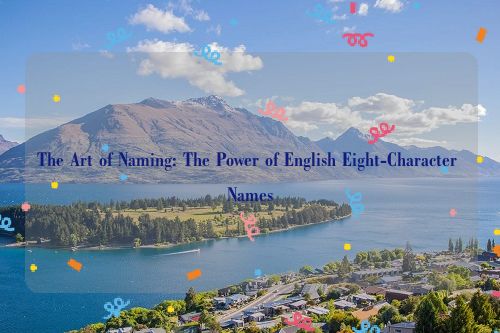The Art of Naming: The Power of English Eight-Character Names
Names carry a profound significance that transcends mere identification; they are a reflection of culture, history, and personal identity. In many societies, including those that use the English language, names are carefully chosen to encapsulate the hopes, dreams, and values of families for their children. In this article, we delve into the intriguing world of English eight-character names, exploring their origins, significance, and the creative process behind crafting them.
The Allure of Eight-Character Names
Eight-character names hold a unique allure in the English-speaking world, where shorter names are more common. These names are often a blend of traditional and contemporary elements, offering a sense of depth and individuality. The number eight itself is considered auspicious in many cultures, symbolizing prosperity and success. When applied to names, the eight-character length allows for a more detailed and intricate combination of letters and sounds.

Historical Roots
Historically, names in English have evolved from a variety of sources, including biblical names, occupational names, and names derived from places. The use of eight-character names is not as prevalent in English-speaking countries as it is in some Asian cultures, where they are common due to the influence of languages like Mandarin and Cantonese, which utilize a system of characters rather than letters.
However, English eight-character names can be found in the form of hyphenated surnames or compound first names. For example, "Anne-Marie" or "John-Paul" are examples of eight-character first names that have become popular over time.
Crafting an Eight-Character Name
Creating an English eight-character name requires a blend of creativity, cultural sensitivity, and an understanding of phonetics. Parents who wish to bestow such a name upon their child often look for a combination that is both meaningful and euphonic.
Meaningful Names
A meaningful name might combine two four-letter words or names that hold significance to the family. For instance, "Grace-Love" or "Hope-Faith" are names that not only sound pleasant but also convey a positive message or value.
Euphonic Names
Euphony, or the quality of sounding pleasant to the ear, is crucial when creating a name of any length. Eight-character names should flow smoothly, with the sounds complementing each other. Names like "Alexander-Morgan" or "Isabella-Rose" are examples of names that roll off the tongue and are pleasing to the ear.
Cultural Fusion
With the increasing diversity in English-speaking countries, cultural fusion names have become more common. These names might combine English names with names from other languages, creating a unique eight-character name. For example, "Elena-Maria" or "Michael-Angelo" blend European names with a touch of exotic flair.
The Creative Process
The creative process behind crafting an eight-character name involves several steps:
- Determine the Name's Purpose: Is the name meant to reflect family history, cultural heritage, or personal characteristics?
- Research Names: Look into names from various cultures and languages that resonate with the intended purpose.
- Consider Sound and Rhythm: Experiment with combinations that sound harmonious and have a pleasing rhythm.
- Check for Meaning: Ensure that the name's meaning is positive and aligns with the family's values.
- Consider Spelling and Pronunciation: Choose a spelling that is intuitive and a pronunciation that is easy to understand.
Examples of English Eight-Character Names
To inspire creativity, here are some examples of English eight-character names:
- Sophia-Avery
- Gabriel-Mason
- Elizabeth-Rose
- Alexander-Logan
- Charlotte-Amelia
- Oliver-Theodore
Each of these names has its own unique character and charm, reflecting the diverse ways in which parents can express their creativity within an eight-character framework.
Conclusion
The art of naming is a deeply personal and creative endeavor, and English eight-character names offer a wide canvas for self-expression. Whether rooted in tradition or crafted for modern tastes, these names carry the potential to reflect a family's story and aspirations for their child. As we continue to witness the evolution of naming trends, the eight-character name stands out as a testament to the enduring power of names to shape identity and leave a lasting impression.
In the vast tapestry of language and culture, the act of naming holds a profound significance. From ancient traditions to modern practices, the process of bestowing a name upon an individual or entity is a deeply personal and meaningful endeavor. This article delves into the fascinating concept of using the Octet Principle to craft English names, blending the essence of numerology and linguistic creativity.
Introduction
Naming is not merely an act of assigning a label; it is a reflection of identity, personality, and cultural heritage. In many cultures, names carry the weight of祖先 (ancestors), symbolizing a connection to the past and aspirations for the future. The Octet Principle, inspired by the Chinese philosophy of BaZi (八字), offers a unique approach to naming that harmonizes the balance of elements and energies within a name.
Understanding the Octet Principle
The Octet Principle, or BaZi, is a Chinese metaphysical system that analyzes a person's birth chart based on the year, month, day, and hour of birth. It divides the chart into eight components, each representing a different aspect of life. These components are the five elements (Wood, Fire, Earth, Metal, and Water) and three relationships (Heavenly Stems, Earthly Branches, and Human Influence).
The Five Elements
The five elements are foundational to BaZi and represent the dynamic forces of nature. Each element corresponds to specific traits and characteristics:
- Wood: Growth, creativity, flexibility
- Fire: Passion, warmth, energy
- Earth: Stability, groundedness, nurturing
- Metal: Structure, discipline, resilience
- Water: Adaptability, wisdom, flow
The Three Relationships
The three relationships provide a framework for understanding the interactions between the elements:
- Heavenly Stems: Represent the celestial influence on the individual.
- Earthly Branches: Reflect the earthly influences and interactions.
- Human Influence: Combines the individual's personal characteristics with the influence of the heavens and earth.
Applying the Octet Principle to English Naming
The Octet Principle can be adapted to create balanced and meaningful English names by considering the numerical and elemental properties of letters. Here’s how you can apply this principle:
Step 1: Analyze the Birth Chart
Begin by calculating the BaZi chart based on the individual's birth date and time. This chart will provide a detailed breakdown of the elements and relationships present in their life.
Step 2: Identify the Dominant Element
Identify the dominant element in the chart. This element represents the core aspect of the individual's personality and should be reflected in their name.
Step 3: Choose Letters Based on Elements
Assign numerical values to the letters of the alphabet based on their elemental properties:
- Wood: A, J, S, Y
- Fire: B, E, L, O, U, Z
- Earth: C, D, G, H, K, N, Q, R, T, W
- Metal: F, I, M, P, V, X
- Water: A, J, S, Y
Step 4: Craft the Name
Using the identified dominant element, select letters that correspond to that element. Aim for a balance of elements in the name to create harmony and balance.
Examples of English Names Crafted with the Octet Principle
1. Wood Element Dominance
Name: Jackson
- J: Wood
- A: Wood
- C: Earth
- K: Earth
- S: Wood
- O: Fire
- N: Earth
2. Fire Element Dominance
Name: Benjamin
- B: Fire
- E: Fire
- N: Earth
- J: Wood
- A: Wood
- M: Metal
- I: Metal
3. Earth Element Dominance
Name: Christopher
- C: Earth
- H: Earth
- R: Earth
- I: Metal
- S: Wood
- T: Earth
- O: Fire
- P: Metal
- H: Earth
- E: Fire
- R: Earth
4. Metal Element Dominance
Name: Victoria
- V: Metal
- I: Metal
- C: Earth
- T: Earth
- O: Fire
- R: Earth
- I: Metal
- A: Wood
5. Water Element Dominance
Name: Alexander
- A: Water
- L: Fire
- E: Fire
- X: Metal
- A: Water
- N: Earth
- **
 微信客服
微信客服
